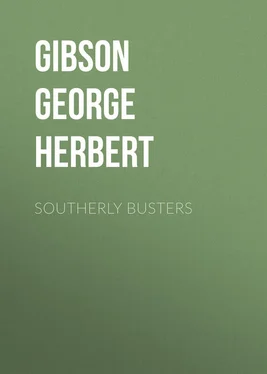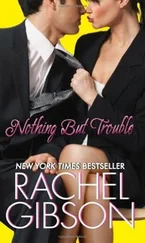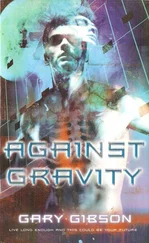George Gibson - Southerly Busters
Здесь есть возможность читать онлайн «George Gibson - Southerly Busters» — ознакомительный отрывок электронной книги совершенно бесплатно, а после прочтения отрывка купить полную версию. В некоторых случаях можно слушать аудио, скачать через торрент в формате fb2 и присутствует краткое содержание. Жанр: foreign_antique, foreign_prose, на английском языке. Описание произведения, (предисловие) а так же отзывы посетителей доступны на портале библиотеки ЛибКат.
- Название:Southerly Busters
- Автор:
- Жанр:
- Год:неизвестен
- ISBN:нет данных
- Рейтинг книги:5 / 5. Голосов: 1
-
Избранное:Добавить в избранное
- Отзывы:
-
Ваша оценка:
- 100
- 1
- 2
- 3
- 4
- 5
Southerly Busters: краткое содержание, описание и аннотация
Предлагаем к чтению аннотацию, описание, краткое содержание или предисловие (зависит от того, что написал сам автор книги «Southerly Busters»). Если вы не нашли необходимую информацию о книге — напишите в комментариях, мы постараемся отыскать её.
Southerly Busters — читать онлайн ознакомительный отрывок
Ниже представлен текст книги, разбитый по страницам. Система сохранения места последней прочитанной страницы, позволяет с удобством читать онлайн бесплатно книгу «Southerly Busters», без необходимости каждый раз заново искать на чём Вы остановились. Поставьте закладку, и сможете в любой момент перейти на страницу, на которой закончили чтение.
Интервал:
Закладка:
G. H. Gibson
Southerly Busters
NOTES
a. "Billy," a tin pot for making tea in.
b. Young gentlemen getting their "colonial experience" in the bush are called "jackeroos" by the station-hands. The term is seldom heard except in the remote "back-blocks" of the interior.
c. It was formerly the practice of squatters to give a ration of flour, mutton, and, occasionally, tea and sugar, to all persons travelling ostensibly in search of work. The custom, however, as might have been expected, became frightfully abused by loafers, and has of late fallen into disuse, to the intense disgust of the tramping fraternity in general.
d. The Yanko is a noted sheep-station in the Murrumbidge district (the Paradise of loafers), where travellers were, and, I believe, still are, feasted at the expense of the owners, on a scale of great magnificence, and somewhat mistaken liberality.
e. The utterly refined and unsophisticated reader is informed that to "whip the cat" signifies, in nautical parlance, to weep or lament.
AUTHOR'S PREFACE
I AM assured that something in the way of an apologetic preface is always expected from a "new-chum" author who has had the hardihood to jump his Pegasus over the paddock fence (so to speak), and drop, uninvited, into the field of letters; and so, having induced a publisher, in a moment of weakness, to bring me before the public, it behoves me to conciliate that long-suffering body by conforming to all established rules. I am aware that my excuse for inflicting this work on mankind is somewhat "thin" but, such as it is, I will proceed to state it, as a "plea in bar" against all active and offensive expressions of indignation on the part of outraged humanity.
Having "got me some ideas," as Mr Emmett says in the character of "Fritz," and feeling the necessity for inflicting them on somebody imminent, I tried their effect on my own immediate circle of friends. It was not satisfactory. They listened, indeed, for a while, thinking that I was suffering from a slight mental derangement which would be best treated by judicious humouring. Some even affected to be entertained, and laughed (what a hollow mockery of merriment it was!) at atrocious puns; but I could see the look of hate steal over countenances which had hitherto beamed on me with interest and affection, and was not deceived.
I saw that friendship would not long survive such a test and desisted; but it was too late. They perceived I had what Artemus Ward calls the "poetry disease;" feared that it might be infectious; knew that it was an insufferable bore to the afflicted party's circle of acquaintances; and – forgot to visit me.
When their familiar knocks no longer resounded on the door of my lodging in – street, and their familiar footsteps ceased to crush the cockroaches on the dark and winding staircase leading to my apartment, I bethought me of that institution which I had always heard alluded to as the "kind and generous public." Here, I thought (for I was unsophisticated), is the very friend I am in need of, which will receive me with its thousand arms, laugh with me with its thousand mouths, weep with me with its thousand eyes, and whose thousand hearts will beat in unison with mine whether my mood be one of sadness or of joy; behave itself, in fact, like a species of benevolent and sympathetic Hydra, shorn of its terrors, and fit to take part in the innocent and arcadian recreations of the millenium, when the (literary) lion shall lie down with the critic, and newspapers shall not lie any more – even for money.
During my hunt for that all essential auxiliary, a publisher, without whom the first step on the road to literary distinction (or extinction) cannot be taken, I learnt a few plain truths about my hydra-headed friend; amongst others that he was not to be hoodwinked, and would neither laugh, weep, nor sympathise unless he saw good and sufficient cause. I am in consequence not quite so sanguine as I was. However, I have gone too far to recede, and have concluded to throw myself on the bosom or bosoms of that animal and take my chances of annihilation.
One of my unsympathising friends assured me the other day that my book would certainly send anyone to sleep who should attempt its perusal. I gave him a ballad to read, and watched him anxiously while he skimmed a page or two. He did not sleep – not he, but a raging thirst overcame him at the fourteenth verse, and he begged me to send for a jug of "half-and-half" with such earnestness that a new and dreadful apprehension filled my breast. If this was to be the effect of my work on the Public at large, I should empty the Temperance Hall, and fill the Inebriate Asylum in six months! As I had hitherto prided myself that my work was entirely free from any immoral tendency, I earnestly hoped that his organization was a peculiar one, and that its effect on him was exceptional, and not; likely to happen again.
Sleep, indeed! Would that these pages might be found to possess the subtle power of inducing "tired Nature's sweet restorer" to visit the weary eyelids of knocked-up humanity; that they might become a domestic necessity, like Winslows "soothing-syrup," and "a blessing to mothers;" that the critic – pausing midway in a burst of scathing invective against their literary and metrical deficiencies – overcome by their drowsy influence – might sink in dreamless slumber, and wake to sing in praise of their narcotic properties, and chaunt their merits as a soporific.
In conclusion, I would fain ask thee, gentlest of gentle readers, to look with leniency on the many defects and shortcomings of this volume, and to remember that the writer was long, if not an outcast, a homeless wanderer among the saltbush plains and and sandhills of Australia, and the kauri and pouriri forests of New Zealand; that, for seven years, the prototypes of "Ancient Bill," hereinafter mentioned, were his associates; and that, if these experiences have enabled him to touch with some degree of accuracy on matters relating to the Bush, they have at the same time militated against the cultivation of those refinements of style and language which commend the modern author to his reader, and which are Only to be acquired in the civilized atmosphere of a city.
N.B. – I desire here to thank my friend, Mr. Henry Wise, of Sydney, to whom I am indebted for the design which adorns the cover of the book.
I beheld a shadow dodging, on the pavement 'neath my
lodging,
'Neath my unpretending lodging – opposite the very door:
"'Tis that prodigal," I muttered, "who enjoys the second
floor —
He it is, and nothing more."
Answering my thoughts, I stated, "'Tis the artist that's located
Here, returning home belated, seeking entrance at the door —
Coming back from where he's revelled, and, like me, with locks
dishevelled,
Wits besotted and bedevilled, oft I've seen him so before;
'Tis no rare unknown occurrence, but a customed thing of
yore —
Jones it is, and nothing more."
Certain then 'twas no illusion, "Sir," I said, in some
confusion,
"Pardon my abrupt intrusion – Mr. Jones, we've met before;
Potent drinks have o'er me bubbled, and the fact is I was
troubled,
For your form seemed strangely doubled, and my brain is sick
and sore —
Let us seek my room and cupboard, and its mystery explore —
There is gin, if nothing more."
Deep into the darkness glaring, I beheld a radiance flaring,
And a pair of eyes were staring – eyes I'd never seen before —
And, my fear and dread enhancing, towards me came a form
advancing,
And the rays of light were dancing from a lantern which it
bore —
'Twas a regulation bull's-eye – "'Tis a (something) Trap," I
swore —
"'Tis a Trap, and nothing more."
Интервал:
Закладка:
Похожие книги на «Southerly Busters»
Представляем Вашему вниманию похожие книги на «Southerly Busters» списком для выбора. Мы отобрали схожую по названию и смыслу литературу в надежде предоставить читателям больше вариантов отыскать новые, интересные, ещё непрочитанные произведения.
Обсуждение, отзывы о книге «Southerly Busters» и просто собственные мнения читателей. Оставьте ваши комментарии, напишите, что Вы думаете о произведении, его смысле или главных героях. Укажите что конкретно понравилось, а что нет, и почему Вы так считаете.











